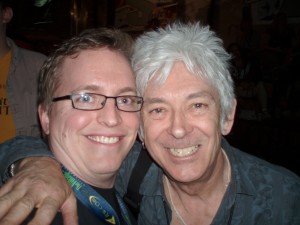Fresh off his SXSW appearance, English punk-folk artist Billy Bragg wrote a guest op-ed piece in Saturday’s New York Times* about the lack of attention (and money) paid to artists whose work is published on social networking sites like MySpace and Bebo, a company that was recently sold for $850 million to AOL.
Bragg makes some rather salient points, the clearest of which is this: why is it that the contributions of artists to the value of social networking sites are not, in fact, valued in some kind of monetary way? To that point, Bragg says this:
The claim that sites such as MySpace and Bebo are doing us a favor by promoting our work is disingenuous. Radio stations also promote our work, but they pay us a royalty that recognizes our contribution to their business. Why should that not apply to the Internet, too?
I’m not wholly against Bragg’s point here. But offering analogies as a catch-all gets complicated in discussions like this.
Yes, websites make money through advertising just like radio stations do. And video and audio clips are part of why AOL thought Bebo was worth $850 million. But with radio stations, you’re paying to reach a certain audience segment and demographic. That’s really the service that radio stations are providing, and entertainment – whether in the form of music or talk or other programming – is the only content radio stations provide to make people stick around long enough for the ads to reach them.
But the truth is, social networking sites, as well as sites like Blogger, or feed readers or what have you function as publishing entities. And the reason why people choose one site over another – thereby giving them value, one might say – is because of who uses them to publish. I’m more likely to use one site over another if my friends use it (Facebook) or if I find content there worth checking out (Flickr).
In most cases, this comes from user-generated content. So why couldn’t I make the argument that Facebook owes me a penny every time I post something to my Wall, or Flickr should drop a nickel into my bank account when I post new pictures? While I won’t flatter myself that more people on the whole are interested in checking out a bon mot from me on Facebook than are hoping to hear a Billy Bragg song, I can at least say there’s a certain segment of my audience (meager as it may be) that IS more interested in witticisms from me than in “Old Clash Fan Fight Song” (if only because they’ve never heard Bragg’s music). So in essence, for a (teeny, tiny) portion of Facebook’s audience, I am adding more value to the site than Billy Bragg. In Bragg’s radio example, I’m just as valuable as him for advertisers who are seeking to reach the “friends of Our Man In Chicago” demographic. So why shouldn’t he and I both partake of content licensing fees?
I’m exaggerating a bit here. But it isn’t out of the realm of possibility – in fact, it’s happened a handful of times in the last few years – that an everyday person comes out of nowhere and produces content that so many people want to see that it makes a significant contribution to the site’s bottom line. It pains me to offer this particular example but Tia Tequila has 2,952,620 MySpace friends while Billy Bragg has “only” 33,121. (For a less problematic example, see Warren Ellis who has about 21,000 friends). So at what point do we say “This person needs to be compensated for their contributions to the site?”
I don’t really have a blanket solution, and I doubt most other folks do, which is why it’s applying one medium’s licensing and payment structures to the Internet doesn’t cover all manner of sins. It really is its own beast.
Having said all that, I think Bragg has a point, but he’s using the wrong analogy. Internet sites that use previously-created content in this way (meaning content not created specifically for the site like a Wall post or a Flickr picture) are a lot like bars that play music on jukeboxes or over PA systems. These bars all pay a licensing fee to organizations like ASCAP which then distributes this money to the artists (ideally, anyway). Perhaps it’s time to set up a similar system for corporate-backed internet sites as well.
* h/t to The Daily Swarm, which I’m pleased to see is regularly seeking out the work of Chicago writers and critics whether they’re writing for the Tribune, the Sun-Times, Chicagoist or the sexiest blog in Chicago.


